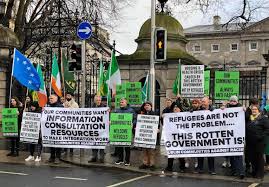Migration has become one of the sharpest dividing lines in Irish politics. Across estates, villages, and towns, people feel the crunch of housing shortages, collapsing health services, and precarious work. The far right has seized on these frustrations, directing anger at migrants instead of profiteers. Meanwhile, parts of the left retreat to easy slogans of “no borders.” However well-meaning, such positions ring hollow to working-class communities living with daily pressures. If we ignore this issue, we abandon the ground to reactionary forces. A Marxist response must acknowledge concerns honestly, bust the myths, and unite Irish and migrant workers against the real culprits: landlords, vulture funds, and imperialism.
Migration is not random, nor is it an “invasion.” It is driven by material forces. Wars waged by the US, Britain, and the EU in Iraq, Libya, Afghanistan, and Syria have displaced millions. IMF and World Bank programmes have gutted economies in Africa and Latin America. Climate collapse—caused overwhelmingly by wealthy nations—is rendering parts of the Global South unliveable. People do not leave families and homes lightly; flows “north” are the direct consequence of imperialism. To blame the migrant is to let the true culprits—war-makers, financiers, and fossil capitalists—off the hook.
Migrants, Refugees, and Asylum Seekers—Not the Same
The far right thrives on confusion, painting migrants, refugees, and asylum seekers as one and the same. The distinctions matter.
Refugees and asylum seekers flee war, persecution, or climate collapse. States are obliged under international law to protect them. In Ireland, many are still warehoused in Direct Provision—a system condemned for years as degrading and slated (but repeatedly delayed) for replacement following the 2021 White Paper.
Economic migrants move for work or study. They do not automatically qualify for housing or benefits. Local authorities apply the same income and residency rules to everyone on social-housing lists. As a housing officer in Carlow put it to me: “Migrants go through the same lists, with the same thresholds, as Irish applicants. Nobody skips the queue.” Councils such as Kilkenny publish clear thresholds and local-connection criteria—evidence that directly contradicts the “free house” myth.
Ireland’s housing crisis was not caused by refugees; it was caused by successive governments handing housing policy to developers, vulture funds, and landlords.
Ireland saw high inward migration in the 12 months to April 2024—almost 150,000 arrivals—including 30,000 returning Irish citizens and 27,000 other EU citizens. Net migration was 79,000. By April 2025, immigration fell to 125,300, with net migration at 59,700. The language of “invasion” collapses under scrutiny; what’s missing is state investment in housing and services.
If we want to know where our homes went, look to the funds. In 2022, so-called vulture funds bought about 6,000 homes—roughly one in ten sold that year. Thousands of households are now trapped on punitive mortgage rates—around 7,000 paying 8.5–10%. Billions have been extracted from communities by corporate landlords—yet it is migrants who are blamed, while profiteers continue unhindered.
Community Concerns and Far-Right Exploitation
We must also acknowledge reality. In some small towns, the sudden arrival of refugee families strains already weak services and changes the feel of local life. When people are not consulted, anger grows. The state then dumps responsibility on residents—without investing in housing, schools, or healthcare. That vacuum is where the far right moves in, turning frustration into racist mobilisation, as seen in East Wall and elsewhere. Even Gardaí have stated there is no significant link between asylum seekers and increased crime—a point that punctures the scare stories used to inflame tensions. The anger is real, but it is misdirected.
Recent attacks on migrants—particularly Indian workers—show how dangerous this path is. Racist violence is not just an attack on migrants; it is an attack on the entire working class. Division weakens us all while landlords and bosses grow stronger.
Integration, Not Division
If there is an alternative to division, it lies in solidarity. Communities are right to feel anger when decisions about refugee accommodation are imposed from above with no consultation and no explanation. That anger, however, should not be turned against the families arriving, but against a system that refuses transparency. When communities are brought into the conversation—when plans are explained, timelines are clear, and resourcing is guaranteed—fear and resentment can give way to understanding.
But consultation alone is not enough. The state has starved public housing of investment while shovelling resources into the pockets of funds. As long as there are too few homes, resentment will grow. The answer is not to pit Irish families against migrant families, but to build homes for all—by breaking with profiteers and putting housing back in public hands.
Integration also demands support. Families arriving in Ireland need English classes, school places, health services, and community links. Without these, isolation sets in, making it easier for reactionaries to sow division. A society that invests in integration reaps stronger, more cohesive communities.
Most importantly, integration is about unity in struggle. Irish and migrant workers face the same landlords, the same bosses, the same collapsing services. When unions fight wage theft, when tenants resist rent hikes, when communities demand investment, it matters little whether the hands raised in solidarity are Irish-born or migrant. What matters is that they are raised together.
A Class Response
Migration is not the cause of Ireland’s crisis. The roots lie in imperialist wars that displace millions abroad, and in profiteering at home that leaves workers scrambling for housing and healthcare. The comprador class in Ireland—landlords, developers, and politicians who bend the knee to EU and US interests—thrives on this chaos.
The far right offers division, scapegoating migrants for problems they did not create. Liberal moralism offers slogans that smooth over contradictions but fail to answer people’s lived realities. The Marxist position is different. It exposes imperialism as the engine of displacement; defends migrants and refugees from scapegoating and violence; insists on fairness, regulation, and transparency; and, above all, unites the working class—Irish-born and migrant—against the real enemy: capitalism.
As Connolly warned, “the worker is robbed by the system that creates wealth for others.” Today that robbery continues. It is not the refugee in a Direct Provision centre who robs the Irish worker of a home, but the vulture fund sitting on thousands of properties. It is not the migrant family seeking shelter who robs us of services, but the comprador class that drains our resources into private profit.
The task is clear: redirect anger away from our neighbours and towards those who profit from division and misery. If we succeed, we can transform fear into solidarity, division into unity, and anger into the collective struggle for housing, sovereignty, and socialism.
Fact Box:
The vultures stole our homes — not refugees.
- 1 in 10 new homes sold in 2022 went to vulture funds (around 6,000 houses).
- By 2023, funds controlled 15,000+ rental units, making them some of Ireland’s biggest landlords.
- 7,000 mortgage holders are trapped on punitive rates of 8.5–10%, set by vulture funds.
- The state leases back homes from funds at high cost, instead of building public housing.
- 13,000 people homeless — including nearly 4,000 children — while tens of thousands of homes lie vacant or hoarded.
The crisis is not caused by migrants — it is driven by profiteering, speculation, and state policy that serves landlords and funds over people.






